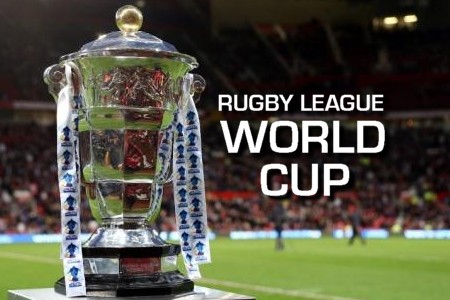From South Africa to Wembley Stadium, England’s 2013 Rugby League World Cup buildup and results were interesting to say the least.
The Rugby Football League invested a lot of time, money and effort to make sure that England got the best preparation for the 2013 World Cup. No team that has come before had a full time coach spend so much time and money to make sure his team had the best shot at winning the competition.
England’s famous altitude training came off as nothing more than a gimmick. That they went all the way to South African for altitude training was questionable at best. That they removed themselves completely from the type of conditions they expected to see during the World Cup was ridiculous. That they stayed in South Africa for such a short period of time was laughable. That they arrived back home early enough for any possible effects of altitude training to wear off was hilarious. That they arrived in England for a home based World Cup the day after Australia was unforgivable.
England talked up a big game heading into the World Cup. That was quickly snuffed out however when they lost a World Cup warm-up match against Italy. The 15-14 win by Italy was a huge wake-up call for England. They could not take any opponent lightly, something English teams is many different sports are famous for doing.
As the kickoff to the World Cup opener drew closer, off field issues raised their ugly head.
Gareth Hock was kicked out of the England squad before the World Cup for undisclosed reasons. Other players were alleged to have been reprimanded as well. While England’s management tried to keep a tight lid on things, it was obvious a number of players in the squad were not taking their national representation all that seriously. This of course was compounded later in the tournament when Zak Hardaker was released from the squad mid way through the tournament. While England’s management once again shut up shop and refused to say what had happened, it was serious enough for his club, the Leeds Rhino’s to fine him once they had received details about the matter.
Then, heading into England’s semi final against New Zealand, Rangi Chase was dropped from the side. This was a very strange decision. Chase had played every game for England and was easily the better of the two halves they had played with throughout the tournament. Chase was then released from the English squad and allowed to go home. The official word was that Chase wanted to be with his family, and had taken his demotion hard. By this point though, people were rightfully skeptical of anything the England camp had to say.
All up the 24 man England squad has three members who were released from their duties during the tournament with others facing undisclosed disciplinary measures. That is either a case of management picking players who were unreliable and who should not have had time and effort invested into them, or it showed that discipline within the England camp in general was very poor. Either way, it reflects terribly on the way the English team was run and makes you question how many within the squad had their minds on the job at hand.
On the field England’s results were patchy at best. Many of the positional changes made throughout the tournament were very questionable.
Key players in the English lineup were either dropped or not selected at all in certain games.Squad rotation may be one explanation, but if that is the case their rotation of the squad was very poor.
First choice players like James Roby, Josh Charnley, Ryan Hall and James Graham were headscratchingly left out of key games. This meant that the English side never really got the chance to gel as a team.
Worst of all was the omission of young half Gareth Widdop. A key member of the Melbourne Storm, a player with big match experience and a very capable play makers, Widdop found himself on the outer with the English selectors for what ever reason. As England’s halves struggled in pretty much every game they played, everyone was wondering why Widdop was not in the side. That Kevin Sinfield was playing so poorly, and out of position, at the expense of Widdop, was very very strange.
Just when it seemed at though Widdop had had his papers stamped, England called him back into the starting side for their semi final clash against New Zealand. Having stuck with the same halves pairing throughout the entire World Cup, Steve McNamara now had decided he needed a change of direction.
Widdop came in and played fairly well considering the no win situation he was handed by his coach. It leaves a lot of question marks though over how he and the team in general was handled over the course of the tournament.
England played well in their semi final loss to New Zealand and that is something English supporters can take some comfort in. However the reaction to the loss was terrible. Quotes out of the English camp that “the better team lost” and the general feeling that they deserved to win more than New Zealand did really shows that there is still an unjustified sense of entitlement within the English game that needs to be removed if any progress is to be made.
History is unlikely to just England’s 2013 World Cup campaign all that favorably. The same can be said for every team that walks away without the trophy at the end of the day. While most teams maximized their potential during the tournament you would be hard pressed to suggest England did the same.
So in 2017, what should England do differently?
Coaching
First and foremost I believe that England needs a top class coach that is at the cutting edge of the sport. They don’t need to be a full time national coach and have no ties to any club. I tend to think that at representative level you just need someone that can come in and do the job well. They don’t need to commit and entire year to coach a handful of games. Just as long as they are committed when it matters.
I think that if the Rugby Football League wants a successful English team they need to employ a top level NRL coach. I don’t care what country the coach comes from, just as long as he is a winner and he has a history of bringing teams together who are successful at the highest levels of the game.
For the right amount of money, everyone is available. For the right amount of money Wayne Bennett left the Brisbane Broncos. Coaches these days are professionals. They don’t care what the team is they are coaching, just as long as the cheques don’t bounce and they are given all the resources they require to get the job done.
Wayne Bennett, Des Hasler and Craig Bellamy stand head and shoulders above every other coach in the game today. They are all proven winners and they have done so with big turnovers of players and in Bennett and Hasler’s case, by moving clubs. All three have won NRL Grand Finals and all three have been part of representative football in some capacity.
I could go on and list coaches that would probably get the job done, coaches that are very good but who don’t have the same winning background as the three named above do. I have no doubt that Ivan Cleary from the Penrith Panthers would be an astute buy. Someone like Trent Robinson wouldn’t be the worst choice either. In my opinion though, you set your goals high. If you want the best, go after the best. Then look at the alternatives if you have no other choice.
Preparation
Its hard to build a siege mentality when you’re jet-setting around the world to stay in sun drenched resorts in South Africa leading into an international competition that is predominantly played in northern England.
England had the perfect opportunity to remain in England, acclimatize to the cold, wet conditions of the changing seasons that they would face during the tournament, and watch teams arrive from overseas knowing that they were behind in being able to prepare for the same conditions.
The English coaching staff could have thrashed the English squad for a few weeks leading into the World Cup. They would have then had time to allow them to rest and prepare for the World Cup opener so they weren’t burnt out. They decided against this approach though.
I personally would have had the English squad eating dirt, training on muddy fields and hating life heading into the World Cup. Forget the money, forget the media, forget the fans. Spend a few weeks carving yourself into a machine that eats, breathes and sleeps for performance. No time to socialize, no time for any off field trouble, the relief that English players would have felt when they went home at night to sleep in their own beds would have only been matched by the dread they felt knowing what was ahead of them the next day.
That way, when the pampered Kangaroo’s turned up in England, complaining about the cold weather and the rain, I’d have a squad that embraced it. I’d have a squad that could look across the field before kick off and know without a shadow of a doubt that they were better prepared for this contest than their opposition.
I challenge anyone to tell me why this type of preparation would have been worse for England than the first class, armchair ride they went through for the last few weeks.
Attitude
There is not doubt that some players in the English squad want to win at any cost. They don’t care about anything other than performing at their best and leaving everything they’ve got out on the field. There are other though that just seem to be along for the ride.
Every team at the World Cup has a different type of attitude. New Zealand for instance can be very intense but every so often they just don’t turn up for what ever reason. A team like Australia that has a very long history of players who come together in representative camps for State Of Origin and Test football has made switching on and off an art form. They can look relaxed and like they are just enjoying life. Then game time comes around and they slip back into what they know. They can blow any team off the field on their day.
England had off field issues to deal with and players who were obviously not entirely committed to the cause. That sort of thing needs to change. Even if it means not selecting certain players who would otherwise be in the squad because of their talent alone, England needs a shift in attitude. When push comes to shove, I doubt you’d find many people within the game that things England wants it enough. Only England can change that.
Looking Towards The Future
The 2017 World Cup starts now.
England needs to build the core of that side from their next international match. That may mean moving on certain players. It may mean giving a few youngsters test jerseys ahead of their time. England has the luxury of being able to play a number of international matches at home against France, Scotland, Wales and Ireland if it chooses to schedule games against them. The next England coach needs to start selecting players he believes could be there in 2017.
Sure some players won’t make it that far. Form, injuries, retirements and better players coming through will make sure of that. That is what a coach wants though. Invest time and effort into what you believe will be your best lineup and if someone better comes along to change your plans, well, its a fantastic problem for any coach to have.
This time around England left it too late. They selected certain players who had seen better days or who had simply never performed at international level.
England’s 2017 World Cup team will mostly be selected from the National Rugby League. That is simply a fact of life the RFL has no control over. That means that the next English coach needs to take a very close look at every single player in the National Rugby League that is eligible to play for England. Another reason why an NRL coach wouldn’t be such a bad thing.
Can England Improve?
When you consider that at the 2017 World Cup most players selected by England will be playing and training at a much higher level in the NRL, getting regular big game experience in the worlds best competition by a very wide margin, if England can get the right coach for the team and prepare the side for the conditions they will be facing in the World Cup itself, there is no reason to think they won’t improve.
The problem is that the English team is administered by the Rugby Football League, an organisation that manages to stuff up pretty much everything it touches. Any chance that England improves will most likely be down to the club environment English players find themselves in rather than any influence the Rugby Football League has.
As we saw during the 2013 World Cup, the way a team is manages can have a crucial impact on the field. Success has to start from the very top. England’s might find their players improve as they gain more experience in the NRL, but all of that won’t count for much is the English team is manages in the same shambolic manner that the Rugby Football League has become famous for in all of its dealings.
As always, time will tell. As always, the history books will record the outcome.






A fair article, for once.
Over the next 4 years england needs to have as many of their top players in the NRL as possible.
By the 2017 world cup, more than half of englands squad will be playing the nrl. That is a good thing, playing high intesnity games week in week out, against the high quality of players they will face in an international jersey will elevate their quality.
Mcnamara has put into place some very good structures in the england set up, it’s now time for a higher level coach to come in and take it to the next level. Seriously, you watch a game from 5 or 6 years ago, and compare some of the attacking and defensive play to the game against nz, and it’s just worlds apart. England have improved certain areas tremendously, it just hasn’t manifested itself into results.
What needs to happen now, is england need to get as may top players into the NRL as possible, and they need a top NRL coach (if possible, who would want it?). They put those things into place and theres no reason they can’t win the 2017 world cup.
One of sports biggest dry spells will eventually end it’s just a question of all the pieces finally coming together.